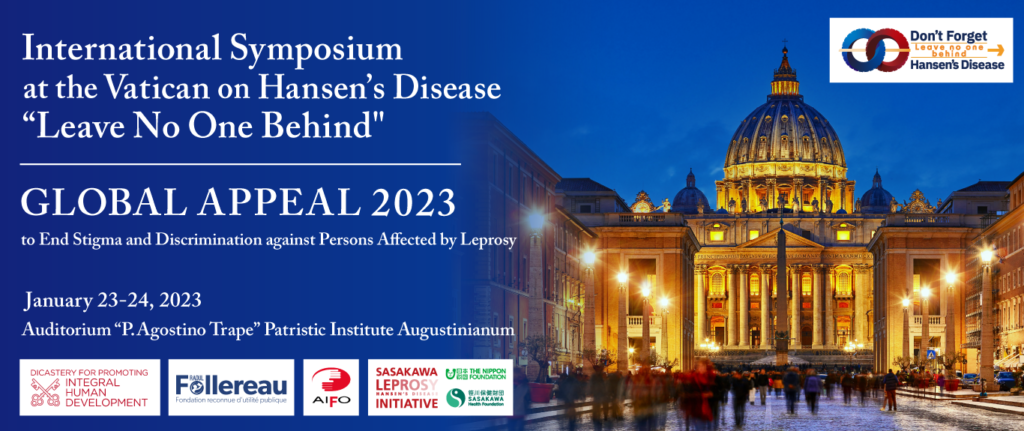Tokyo, Jan. 19, 2023/ French Raoul Follereau Fondation, AIFO-Italian Association Amici di Raoul Follereau and Sasakawa Leprosy (Hansen’s Disease) Initiative, in collaboration with the Dicastery for Promoting Integral Human Development, will co-host the “International Symposium at the Vatican on Hansen’s Disease: Leave No One Behind” on January 23-24, 2023 at Auditorium “P. Agostino Trape”, Patristic Institute Augustinianum.

The two-day symposium brings together health and human rights experts, NGOs, religious organizations, persons affected by Hansen’s disease (also known as leprosy) and other NTDs (Neglected Tropical Diseases) to discuss what actions are needed to achieve the goal of “zero leprosy” and realize a society in which no one is left behind.
The event is scheduled to hear messages from the Holy See through the Dicastery, Dr. Tedros Adhanom Ghebreyesus, Director-General of the World Health Organization, Mr. Volker Türk, UN High Commissioner for Human Rights, Ms. Alice Cruz, UN Special Rapporteur on the elimination of discrimination against persons affected by leprosy and their family members, as well as representatives of the hosting organizations, including Mr. Yohei Sasakawa, WHO Goodwill Ambassador for Leprosy Elimination and chairman of The Nippon Foundation.
The symposium is a follow-up to an International Symposium held at the same venue in 2016 titled “Towards Holistic Care for People with Hansen’s Disease, Respectful of their Dignity.” In the years since, the coronavirus pandemic has had a major impact on leprosy services, disrupting case-finding activities and making it harder to receive treatment and disability care.
The current symposium will review how the pandemic has impacted the lives of persons affected by Hansen’s disease and other socially vulnerable individuals, especially persons with disabilities due to disease, while showcasing best practices to address their needs, with special attention on the role of religious organizations.
In addition, the symposium will incorporate the launch ceremony for Global Appeal 2023 to End Stigma and Discrimination against Persons Affected by Leprosy. Initiated in 2006 by Yohei Sasakawa, the Appeal is issued annually to focus attention on the issue of leprosy and discrimination and generate momentum for an inclusive society. This year’s Appeal is being endorsed by the organizers and participants of the symposium and will be read out by Miss World Brazil 2022, Leticia Frota, who has been using her platform to act as an ambassador for the fight against Hansen’s disease in her country.
A press conference is scheduled from noon on January 23: Representatives of persons affected by leprosy, French Raoul Follereau Foudation, Italian Association Amici di Raoul Follereau and Mr. Yohei Sasakawa, WHO Goodwill Ambassador for Leprosy Elimination will participate as speakers at this moment.
The symposium is taking place as part of Sasakawa Leprosy (Hansen’s Disease) Initiative’s ongoing “Don’t Forget Hansen’s Disease” campaign, which was launched in 2021 to ensure that Hansen’s disease and the needs to those it affects are not overlooked amid the coronavirus pandemic.
To participate in the symposium physically or virtually, please go to this webpage for further details.
About Leprosy
Leprosy, also known as Hansen’s disease, is an infectious disease that mainly affects the skin and peripheral nerves. Prior to the COVID-19 pandemic, which disrupted case-finding activities, over 200,000 new cases were being reported annually. Leprosy is curable with multidrug therapy, but left untreated can result in permanent disability. An estimated 3 to 4 million people are thought to be living with some form of disability as a result of leprosy. Many myths and misunderstandings surround the disease. In various parts of the world, patients, those who have been treated and cured, and even their family members continue to be stigmatized. The discrimination they face limits their opportunities for education, employment and full participation in society.


